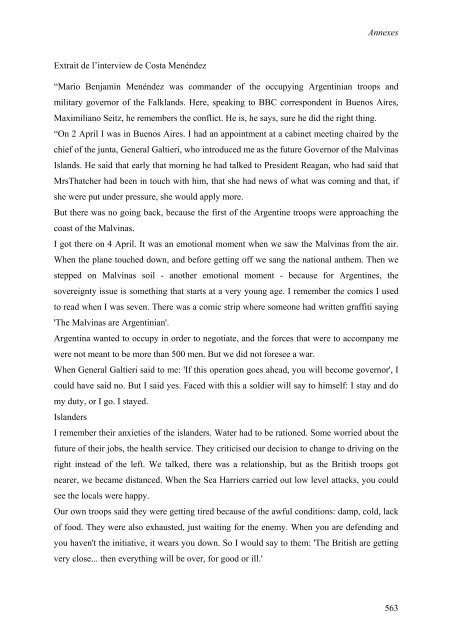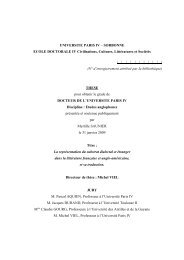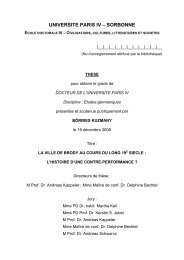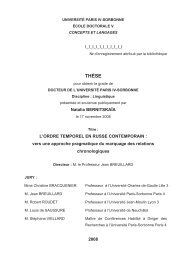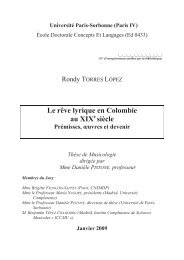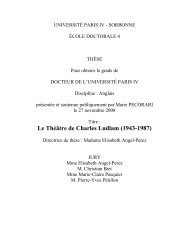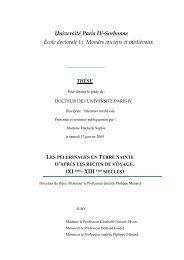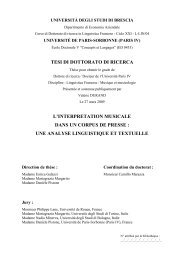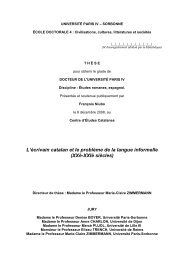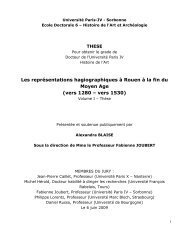- Page 1:
Université Paris IV-Sorbonne Ecole
- Page 4 and 5:
Motivations Les raisons pour lesque
- Page 6 and 7:
Nous soulignons également que les
- Page 8 and 9:
III - Le Tiers-monde : un soutien d
- Page 10 and 11:
I- La diplomatie du 2 avril au 22/2
- Page 12 and 13:
La guerre des Malouines dans les re
- Page 14 and 15:
C’est donc un sujet qui soulève
- Page 16 and 17:
Problématique 16
- Page 18 and 19:
L’Argentine apparaît alors plut
- Page 21 and 22:
Première partie - Présentation de
- Page 23 and 24:
Première partie - Présentation de
- Page 25 and 26:
Cartographie des Falkland 3 3 http:
- Page 27 and 28:
Première partie - Présentation de
- Page 29 and 30:
Première partie - Présentation de
- Page 31 and 32:
Première partie - Présentation de
- Page 33 and 34:
Première partie - Présentation de
- Page 35 and 36:
Première partie - Présentation de
- Page 37 and 38:
Première partie - Présentation de
- Page 39 and 40:
itannique ? Première partie - Pré
- Page 41 and 42:
L’autre intérêt économique des
- Page 43 and 44:
Première partie - Présentation de
- Page 45 and 46:
Première partie - Présentation de
- Page 47 and 48:
Après juin 1982 : la Grande-Bretag
- Page 49 and 50:
Deuxième partie - Les Malouines de
- Page 51 and 52:
Deuxième partie - Les Malouines de
- Page 53 and 54:
Deuxième partie - Les Malouines de
- Page 55 and 56:
Deuxième partie - Les Malouines de
- Page 57 and 58:
Deuxième partie - Les Malouines de
- Page 59 and 60:
Deuxième partie - Les Malouines de
- Page 61 and 62:
Deuxième partie - Les Malouines de
- Page 63 and 64:
Deuxième partie - Les Malouines de
- Page 65 and 66:
Deuxième partie - Les Malouines de
- Page 67 and 68:
Deuxième partie - Les Malouines de
- Page 69 and 70:
Deuxième partie - Les Malouines de
- Page 71 and 72:
Deuxième partie - Les Malouines de
- Page 73 and 74:
Deuxième partie - Les Malouines de
- Page 75 and 76:
Deuxième partie - Les Malouines de
- Page 77 and 78:
Deuxième partie - Les Malouines de
- Page 79 and 80:
Deuxième partie - Les Malouines de
- Page 81 and 82:
Deuxième partie - Les Malouines de
- Page 83 and 84:
Deuxième partie - Les Malouines de
- Page 85 and 86:
Deuxième partie - Les Malouines de
- Page 87 and 88:
Deuxième partie - Les Malouines de
- Page 89 and 90:
Deuxième partie - Les Malouines de
- Page 91 and 92:
Deuxième partie - Les Malouines de
- Page 93 and 94:
Deuxième partie - Les Malouines de
- Page 95 and 96:
Deuxième partie - Les Malouines de
- Page 97 and 98:
Deuxième partie - Les Malouines de
- Page 99 and 100:
Deuxième partie - Les Malouines de
- Page 101 and 102:
Deuxième partie - Les Malouines de
- Page 103 and 104:
Troisième partie - Le point en 198
- Page 105 and 106:
Troisième partie - Le point en 198
- Page 107 and 108:
Troisième partie - Le point en 198
- Page 109 and 110:
Troisième partie - Le point en 198
- Page 111 and 112:
Troisième partie - Le point en 198
- Page 113 and 114:
Troisième partie - Le point en 198
- Page 115 and 116:
Troisième partie - Le point en 198
- Page 117 and 118:
Troisième partie - Le point en 198
- Page 119 and 120:
Quatrième partie - Les gouvernemen
- Page 121 and 122:
Quatrième partie - Les gouvernemen
- Page 123 and 124:
Quatrième partie - Les gouvernemen
- Page 125 and 126:
Quatrième partie - Les gouvernemen
- Page 127 and 128:
Quatrième partie - Les gouvernemen
- Page 129 and 130:
Quatrième partie - Les gouvernemen
- Page 131 and 132:
Quatrième partie - Les gouvernemen
- Page 133 and 134:
Quatrième partie - Les gouvernemen
- Page 135 and 136:
Quatrième partie - Les gouvernemen
- Page 137 and 138:
Quatrième partie - Les gouvernemen
- Page 139 and 140:
Quatrième partie - Les gouvernemen
- Page 141 and 142:
Quatrième partie - Les gouvernemen
- Page 143 and 144:
Quatrième partie - Les gouvernemen
- Page 145 and 146:
Quatrième partie - Les gouvernemen
- Page 147 and 148:
Quatrième partie - Les gouvernemen
- Page 149 and 150:
Quatrième partie - Les gouvernemen
- Page 151 and 152:
Quatrième partie - Les gouvernemen
- Page 153 and 154:
Quatrième partie - Les gouvernemen
- Page 155 and 156:
Quatrième partie - Les gouvernemen
- Page 157 and 158:
Quatrième partie - Les gouvernemen
- Page 159 and 160:
Quatrième partie - Les gouvernemen
- Page 161 and 162:
Quatrième partie - Les gouvernemen
- Page 163 and 164:
Cinquième partie - La guerre appro
- Page 165 and 166:
Cinquième partie - La guerre appro
- Page 167 and 168:
Cinquième partie - La guerre appro
- Page 169 and 170:
Cinquième partie - La guerre appro
- Page 171 and 172:
Cinquième partie - La guerre appro
- Page 173 and 174:
Cinquième partie - La guerre appro
- Page 175 and 176:
Cinquième partie - La guerre appro
- Page 177 and 178:
Cinquième partie - La guerre appro
- Page 179 and 180:
Cinquième partie - La guerre appro
- Page 181 and 182:
Cinquième partie - La guerre appro
- Page 183 and 184:
Cinquième partie - La guerre appro
- Page 185 and 186:
Cinquième partie - La guerre appro
- Page 187 and 188:
Cinquième partie - La guerre appro
- Page 189 and 190:
Cinquième partie - La guerre appro
- Page 191 and 192:
VI) Une guerre non déclarée I - L
- Page 193 and 194:
Sixième partie - Une guerre non d
- Page 195 and 196:
Sixième partie - Une guerre non d
- Page 197 and 198:
Sixième partie - Une guerre non d
- Page 199 and 200:
Sixième partie - Une guerre non d
- Page 201 and 202:
Chapitre 2 Sixième partie - Une gu
- Page 203 and 204:
Sixième partie - Une guerre non d
- Page 205 and 206:
Sixième partie - Une guerre non d
- Page 207 and 208:
Sixième partie - Une guerre non d
- Page 209 and 210:
Sixième partie - Une guerre non d
- Page 211 and 212:
Chapitre 3 Sixième partie - Une gu
- Page 213 and 214:
Sixième partie - Une guerre non d
- Page 215 and 216:
Sixième partie - Une guerre non d
- Page 217 and 218:
Sixième partie - Une guerre non d
- Page 219 and 220:
Septième partie - Les combats pré
- Page 221 and 222:
Septième partie - Les combats pré
- Page 223 and 224:
Septième partie - Les combats pré
- Page 225 and 226:
Septième partie - Les combats pré
- Page 227 and 228:
Septième partie - Les combats pré
- Page 229 and 230:
Septième partie - Les combats pré
- Page 231 and 232:
Septième partie - Les combats pré
- Page 233 and 234:
Septième partie - Les combats pré
- Page 235 and 236:
Septième partie - Les combats pré
- Page 237 and 238:
Septième partie - Les combats pré
- Page 239 and 240:
Huitième partie - Juin 1982 : la f
- Page 241 and 242:
Huitième partie - Juin 1982 : la f
- Page 243 and 244:
Huitième partie - Juin 1982 : la f
- Page 245 and 246:
Huitième partie - Juin 1982 : la f
- Page 247 and 248:
Huitième partie - Juin 1982 : la f
- Page 249 and 250:
Huitième partie - Juin 1982 : la f
- Page 251 and 252:
Les Falklandais soulèvent des pol
- Page 253 and 254:
Huitième partie - Juin 1982 : la f
- Page 255 and 256:
Huitième partie - Juin 1982 : la f
- Page 257 and 258:
Huitième partie - Juin 1982 : la f
- Page 259 and 260:
Les pertes argentines Huitième par
- Page 261 and 262:
Huitième partie - Juin 1982 : la f
- Page 263 and 264:
Huitième partie - Juin 1982 : la f
- Page 265 and 266:
Huitième partie - Juin 1982 : la f
- Page 267 and 268:
Les relations avec les autres pays
- Page 269 and 270:
Neuvième partie - L’enjeu des Al
- Page 271 and 272:
Neuvième partie - L’enjeu des Al
- Page 273 and 274:
Neuvième partie - L’enjeu des Al
- Page 275 and 276:
Neuvième partie - L’enjeu des Al
- Page 277 and 278:
Neuvième partie - L’enjeu des Al
- Page 279 and 280:
Neuvième partie - L’enjeu des Al
- Page 281 and 282:
Neuvième partie - L’enjeu des Al
- Page 283 and 284:
Neuvième partie - L’enjeu des Al
- Page 285 and 286:
Neuvième partie - L’enjeu des Al
- Page 287 and 288:
Neuvième partie - L’enjeu des Al
- Page 289 and 290:
Neuvième partie - L’enjeu des Al
- Page 291 and 292:
Neuvième partie - L’enjeu des Al
- Page 293 and 294:
Neuvième partie - L’enjeu des Al
- Page 295 and 296:
Neuvième partie - L’enjeu des Al
- Page 297 and 298:
Neuvième partie - L’enjeu des Al
- Page 299 and 300:
Neuvième partie - L’enjeu des Al
- Page 301 and 302:
Neuvième partie - L’enjeu des Al
- Page 303 and 304:
Neuvième partie - L’enjeu des Al
- Page 305 and 306:
Neuvième partie - L’enjeu des Al
- Page 307 and 308:
1980... Neuvième partie - L’enje
- Page 309 and 310:
Préambule Dixième partie - L’en
- Page 311 and 312:
Dixième partie - L’enjeu des All
- Page 313 and 314:
Dixième partie - L’enjeu des All
- Page 315 and 316:
Dixième partie - L’enjeu des All
- Page 317 and 318:
Dixième partie - L’enjeu des All
- Page 319 and 320:
Dixième partie - L’enjeu des All
- Page 321 and 322:
Dixième partie - L’enjeu des All
- Page 323 and 324:
Dixième partie - L’enjeu des All
- Page 325 and 326:
Dixième partie - L’enjeu des All
- Page 327 and 328:
Dixième partie - L’enjeu des All
- Page 329 and 330:
Dixième partie - L’enjeu des All
- Page 331 and 332:
Dixième partie - L’enjeu des All
- Page 333 and 334:
Dixième partie - L’enjeu des All
- Page 335 and 336:
Dixième partie - L’enjeu des All
- Page 337 and 338:
Dixième partie - L’enjeu des All
- Page 339 and 340:
Dixième partie - L’enjeu des All
- Page 341 and 342:
Les mesures prises par les pays de
- Page 343 and 344:
Dixième partie - L’enjeu des All
- Page 345 and 346:
Onzième partie - L’intervention
- Page 347 and 348:
Onzième partie - L’intervention
- Page 349 and 350:
Onzième partie - L’intervention
- Page 351 and 352:
Onzième partie - L’intervention
- Page 353 and 354:
Onzième partie - L’intervention
- Page 355 and 356:
Onzième partie - L’intervention
- Page 357 and 358:
Onzième partie - L’intervention
- Page 359 and 360:
Onzième partie - L’intervention
- Page 361 and 362:
Onzième partie - L’intervention
- Page 363 and 364:
Onzième partie - L’intervention
- Page 365 and 366:
Onzième partie - L’intervention
- Page 367 and 368:
Préambule Douzième partie - Les E
- Page 369 and 370:
Douzième partie - Les Etats-Unis a
- Page 371 and 372:
Douzième partie - Les Etats-Unis a
- Page 373 and 374:
Douzième partie - Les Etats-Unis a
- Page 375 and 376:
Douzième partie - Les Etats-Unis a
- Page 377 and 378:
Douzième partie - Les Etats-Unis a
- Page 379 and 380:
Douzième partie - Les Etats-Unis a
- Page 381 and 382:
Douzième partie - Les Etats-Unis a
- Page 383 and 384:
Douzième partie - Les Etats-Unis a
- Page 385 and 386:
Douzième partie - Les Etats-Unis a
- Page 387 and 388:
Treizième partie - Les enjeux éco
- Page 389 and 390:
Treizième partie - Les enjeux éco
- Page 391 and 392:
Treizième partie - Les enjeux éco
- Page 393 and 394:
Treizième partie - Les enjeux éco
- Page 395 and 396:
Treizième partie - Les enjeux éco
- Page 397 and 398:
Treizième partie - Les enjeux éco
- Page 399 and 400:
Treizième partie - Les enjeux éco
- Page 401 and 402:
Treizième partie - Les enjeux éco
- Page 403 and 404:
Treizième partie - Les enjeux éco
- Page 405 and 406:
Treizième partie - Les enjeux éco
- Page 407 and 408:
Treizième partie - Les enjeux éco
- Page 409 and 410:
Quatorzième partie - La diplomatie
- Page 411 and 412:
Quatorzième partie - La diplomatie
- Page 413 and 414:
Quatorzième partie - La diplomatie
- Page 415 and 416:
Quatorzième partie - La diplomatie
- Page 417 and 418:
Quatorzième partie - La diplomatie
- Page 419 and 420:
Quatorzième partie - La diplomatie
- Page 421 and 422:
Quatorzième partie - La diplomatie
- Page 423 and 424:
Quatorzième partie - La diplomatie
- Page 425 and 426:
Quatorzième partie - La diplomatie
- Page 427 and 428:
Quinzième partie - La gestion du c
- Page 429 and 430:
Quinzième partie - La gestion du c
- Page 431 and 432:
La réaction britannique Quinzième
- Page 433 and 434:
Quinzième partie - La gestion du c
- Page 435 and 436:
Quinzième partie - La gestion du c
- Page 437 and 438:
Quinzième partie - La gestion du c
- Page 439 and 440:
Seizième partie - Les conséquence
- Page 441 and 442:
Seizième partie - Les conséquence
- Page 443 and 444:
Seizième partie - Les conséquence
- Page 445 and 446:
Seizième partie - Les conséquence
- Page 447 and 448:
Seizième partie - Les conséquence
- Page 449 and 450:
Seizième partie - Les conséquence
- Page 451 and 452:
Seizième partie - Les conséquence
- Page 453 and 454:
Seizième partie - Les conséquence
- Page 455 and 456:
Seizième partie - Les conséquence
- Page 457 and 458:
Seizième partie - Les conséquence
- Page 459 and 460:
1984. Seizième partie - Les consé
- Page 461 and 462:
Seizième partie - Les conséquence
- Page 463 and 464:
Seizième partie - Les conséquence
- Page 465 and 466:
Seizième partie - Les conséquence
- Page 467 and 468:
Seizième partie - Les conséquence
- Page 469 and 470:
Seizième partie - Les conséquence
- Page 471 and 472:
Seizième partie - Les conséquence
- Page 473 and 474:
Seizième partie - Les conséquence
- Page 475 and 476:
Seizième partie - Les conséquence
- Page 477 and 478:
Seizième partie - Les conséquence
- Page 479 and 480:
Seizième partie - Les conséquence
- Page 481 and 482:
Seizième partie - Les conséquence
- Page 483 and 484:
Dix-septième partie - Les négocia
- Page 485 and 486:
Dix-septième partie - Les négocia
- Page 487 and 488:
Dix-septième partie - Les négocia
- Page 489 and 490:
Dix-septième partie - Les négocia
- Page 491 and 492:
Dix-septième partie - Les négocia
- Page 493 and 494:
Dix-septième partie - Les négocia
- Page 495 and 496:
Dix-septième partie - Les négocia
- Page 497 and 498:
Dix-septième partie - Les négocia
- Page 499 and 500:
Dix-septième partie - Les négocia
- Page 501 and 502:
Dix-septième partie - Les négocia
- Page 503 and 504:
Conclusion Conclusion La guerre des
- Page 505 and 506:
Conclusion La crise aurait pu être
- Page 507 and 508:
Conclusion passionnée de football.
- Page 509 and 510:
Bibliographie Bibliographie 509
- Page 511 and 512: 1) Ouvrages généraux sur l’Arge
- Page 513 and 514: Chilean-Argentine relations, Atar,
- Page 515 and 516: Bibliographie Quellet R.L, Historia
- Page 517 and 518: 4.2 Le gouvernement pendant la guer
- Page 519 and 520: Bibliographie Cichero Félix Esteba
- Page 521 and 522: Bibliographie America Latina y la g
- Page 523 and 524: Bibliographie Gonzalez Julio C, Los
- Page 525 and 526: Library of Congress. Référence: 9
- Page 527 and 528: Sovereignty dispute between Spain a
- Page 529 and 530: Bibliographie Middlebrook Martin, T
- Page 531 and 532: British Library, VH1989.a.346 Bibli
- Page 533 and 534: Biblioteca Nacional Madrid, HA/7270
- Page 535 and 536: Tables des matières Table des mati
- Page 537 and 538: Table des matières Huitième parti
- Page 539 and 540: Table des matières V - Extraits jo
- Page 541 and 542: Table des illustrations 542
- Page 543 and 544: Annexe 1 Chronologie des événemen
- Page 545 and 546: vue d'aboutir à une solution équi
- Page 547 and 548: Refus unanime des Kelpers Annexes -
- Page 549 and 550: Annexes 3 avril Le journal El Pais
- Page 551 and 552: 12 avril Mesure britannique Diploma
- Page 553 and 554: nuit l'aéroport de Port Stanley. A
- Page 555 and 556: 25 mai Militaire Diplomatique coul
- Page 557 and 558: 17 juin Politique intérieure argen
- Page 559 and 560: Extrait de l’interview de Sir Rex
- Page 561: Annexes [At 1230, the governor, wea
- Page 565 and 566: Annexes Affirming that peoples may,
- Page 567 and 568: Annexes 2. Calls upon States concer
- Page 569 and 570: UN Resolutions Security Council Res
- Page 571 and 572: Annexe 4 Documents diplomatiques DO
- Page 573 and 574: Annexes of this Agreement and in co
- Page 575 and 576: Annexes (1) Supervision of the with
- Page 577 and 578: La Prensa La Prensa, 2 de abril 198
- Page 579 and 580: Annexes esta, ello es en parte de c
- Page 581 and 582: Annexes producir la bomba atómica.
- Page 583 and 584: Annexes nombre de Malvinas, y poca
- Page 585 and 586: Annexes programa conozca Argentina
- Page 587 and 588: Annexes Gobierno le solicito una am
- Page 589 and 590: La Prensa, 14 de mayo 1982 Annexes
- Page 591 and 592: Annexes mil doscientos millones de
- Page 593 and 594: La Prensa, 28 de mayo 1982 Annexes
- Page 595 and 596: Annexes han profundizado esas esenc
- Page 597 and 598: Annexes cosas, que la tropa argenti
- Page 599 and 600: Annexes terminado, Healey no quiso
- Page 601 and 602: El Clarín El Clarín, 2 de abril 1
- Page 603 and 604: Annexes “comporta decisiones muy
- Page 605 and 606: Annexes presentar la propuesta de c
- Page 607 and 608: Annexes Patria. Los argentinos, hom
- Page 609 and 610: Annexes conmoverán los cimientos m
- Page 611 and 612: Annexes fuerzas acantonadas en las
- Page 613 and 614:
Annexes ¿Para qué escribirles? En
- Page 615 and 616:
Annexes su presencia en el país.
- Page 617 and 618:
Annexes del Consejo de Seguridad y
- Page 619 and 620:
El Clarín, 25 de abril 1982 Annexe
- Page 621 and 622:
Annexes seria larga y sangrienta y
- Page 623 and 624:
Annexes navales se dijo que tras el
- Page 625 and 626:
Annexes Irlanda pidió que se levan
- Page 627 and 628:
Annexes un intento de invasión fro
- Page 629 and 630:
Annexes recuperación de las Malvin
- Page 631 and 632:
Annexes confiados, con alto espíri
- Page 633 and 634:
El Clarín, 26 de mayo de 1982 Anne
- Page 635 and 636:
El Clarín, 1 de junio de 1982 Anne
- Page 637 and 638:
Annexes pertrechos ofrecidos por Wa
- Page 639 and 640:
Annexes implicancia en la preservac
- Page 641 and 642:
Annexes Con distintos actos y una c
- Page 643 and 644:
Annexes la Argentina trataría de r
- Page 645 and 646:
Annexes pregunto a la primera minis
- Page 647 and 648:
Annexes general Dozo, sostuvo que
- Page 649 and 650:
El Clarín, 22 de junio de 1982 Ann
- Page 651 and 652:
Annexes Consulta a los partidos pol
- Page 653 and 654:
Annexes Naciones Unidas. La cuestio
- Page 655 and 656:
Annexes · L’Espagne : la nef Inc
- Page 657 and 658:
Annexes toujours occupé, sinon rev
- Page 659 and 660:
Annexes argentines". Déclaration d
- Page 661 and 662:
Annexes La Nouvelle-Zélande rompt
- Page 663 and 664:
Annexes Page 43 : Le 6 avril, aux a
- Page 665 and 666:
Annexes Downing street. L'amiral Le
- Page 667 and 668:
Annexes Mme Thatcher déclare: 48 h
- Page 669 and 670:
Annexes surprise, donc les argentin
- Page 671 and 672:
Annexes étaient d'avis pour cesser
- Page 673 and 674:
Défense : M. Amadeo Frugoli. Inté
- Page 675 and 676:
Annexes leur avait été fixée au
- Page 677 and 678:
Annexes nationaliste et anticolonia
- Page 679 and 680:
Annexes Les anglophobes impénitent
- Page 681 and 682:
Annexes La Grande-Bretagne s'est em
- Page 683 and 684:
Annexes seulement de négocier mais
- Page 685 and 686:
Annexes Página 26: La aclaracion d
- Page 687 and 688:
Annexes La explicación acerca de c
- Page 689 and 690:
Annexes En segundo lugar, el inform
- Page 691 and 692:
Annexes Recién en mayo de 1978, po
- Page 693 and 694:
Annexes propios y que la soberanía
- Page 695 and 696:
Annexes Página 126: Después de la
- Page 697 and 698:
Annexes Página 146: Y por otro lad
- Page 699 and 700:
Annexes Bretaña de la humillación
- Page 701 and 702:
Annexes más que centenarias, que s
- Page 703 and 704:
IPS : El bloqueo que anuncia Gran B
- Page 705 and 706:
Annexes haciendo ofrenda de sus vid
- Page 707 and 708:
*la reafirmación del nacionalismo
- Page 709 and 710:
Annexes en Gran Bretaña, la R.D Sh
- Page 711 and 712:
Annexes por un lado y Bolivia y Per
- Page 713 and 714:
Annexes Página 163: En cuanto a la
- Page 715 and 716:
Annexes Página 221: " El 5 de abri
- Page 717 and 718:
Annexes bomba atómica, no porque n
- Page 719 and 720:
Annexes Página 97: "... parece abs
- Page 721 and 722:
Annexes ambos países habían llega
- Page 723 and 724:
Annexes parece indispensable una re
- Page 725 and 726:
Annexes condicionado por las distan
- Page 727 and 728:
Annexes cuyos preparativos se efect
- Page 729 and 730:
Annexes afresion la aplicacion de l
- Page 731 and 732:
Annexes Página 14: En verdad, me r
- Page 733 and 734:
Annexes En lo que correspondería s
- Page 735 and 736:
Annexes nombre de su país, contán
- Page 737 and 738:
Annexes todos mojados y no teníamo
- Page 739 and 740:
Annexes iba a haber combate. Como s
- Page 741 and 742:
Annexes Cichero Felix Esteban, las
- Page 743 and 744:
Annexes Note de fin: “A los Argen
- Page 745 and 746:
Annexes ingleses ante nuestro gobie
- Page 747 and 748:
Annexes Página 85: Casi toda la po
- Page 749 and 750:
Annexes cuanto a la efectividad de
- Page 751 and 752:
Annexes Los Argentinos y las islas
- Page 753 and 754:
Annexes pudiera realizar o adoptar
- Page 755 and 756:
Annexes General (R) D.Carlos Albert
- Page 757:
Annexes Página 60: Ridley debio ha


